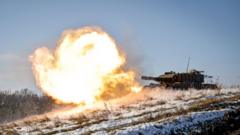Waltz stated, "We have taken a step back," indicating a broader review of U.S. support amidst the current geopolitical landscape. This pause follows the U.S.'s earlier suspension of military aid to Kyiv, highlighting a troubling trend in the Washington-Kyiv relationship. French President Emmanuel Macron responded to these developments by calling for increased European defense spending, emphasizing the need for Europe to prepare for a future potentially devoid of U.S. assistance.
Since Russia's full-scale invasion of Ukraine in 2022, the U.S. has been a critical provider of intelligence, aiding Ukraine in its defense strategies. However, the recent breakdown in communications has prompted serious questions about the future of this support. The precise nature and duration of the pause in intelligence sharing remain somewhat ambiguous, as CIA Director John Ratcliffe hinted at the uncertainty surrounding Ukraine's commitment to pursuing peace negotiations.
While Waltz pointed to a potential future of resumed collaboration, indicating that "if we can nail down these negotiations," there may be a path forward for aid, critics warn that the cessation of U.S. support could significantly undermine Ukrainian defenses. Former Deputy Assistant Secretary of Defense Mick Mulroy emphasized that U.S. intelligence capabilities are unmatched and that their absence would likely embolden Russian advances on Ukrainian territory.
As Ukraine navigates these uncertainties, the potential fallout from the U.S. intelligence pause looms large over the ongoing conflict in the region, raising concerns about the effectiveness of Ukraine's military strategy as they face the Russian aggression head-on.
Since Russia's full-scale invasion of Ukraine in 2022, the U.S. has been a critical provider of intelligence, aiding Ukraine in its defense strategies. However, the recent breakdown in communications has prompted serious questions about the future of this support. The precise nature and duration of the pause in intelligence sharing remain somewhat ambiguous, as CIA Director John Ratcliffe hinted at the uncertainty surrounding Ukraine's commitment to pursuing peace negotiations.
While Waltz pointed to a potential future of resumed collaboration, indicating that "if we can nail down these negotiations," there may be a path forward for aid, critics warn that the cessation of U.S. support could significantly undermine Ukrainian defenses. Former Deputy Assistant Secretary of Defense Mick Mulroy emphasized that U.S. intelligence capabilities are unmatched and that their absence would likely embolden Russian advances on Ukrainian territory.
As Ukraine navigates these uncertainties, the potential fallout from the U.S. intelligence pause looms large over the ongoing conflict in the region, raising concerns about the effectiveness of Ukraine's military strategy as they face the Russian aggression head-on.




















